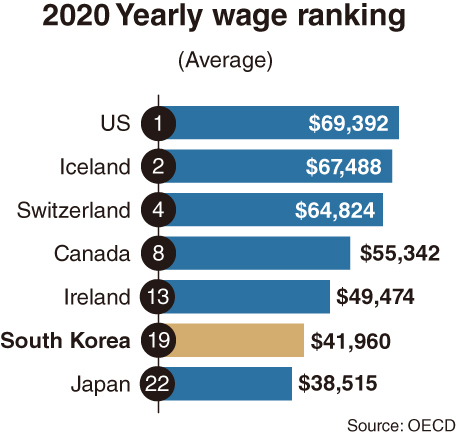[News Focus] Korea lags behind OECD wage average
US ranks No. 1 for 1st time in 30 years
By Kim Yon-sePublished : Aug. 12, 2021 - 15:51

SEJONG -- South Korea continued to fall short of matching the average annual wage of the Organization for Economic Cooperation and Development in 2020, though the nation’s minimum wage has been drastically hiked since 2018.
The yearly wage for Korean employees posted $41,960 on average in 2020, compared to the OECD average of $49,165, according to calculations by the French-based organization.
While the OECD average climbed from $48,935 posted in 2019, Korea’s figure retreated from the corresponding year’s $42,297.
Korea maintained the No. 19 (the same as the ranking in 2019) spot among the 35 countries. Of the total 37 OECD members, Colombia and Turkey were not included in the research.

According to the OECD’s definition, average wages are obtained by dividing the national accounts-based total wage bill by the average number of employees in the total economy. It is then multiplied by the ratio of the average usual weekly hours per full-time employee to the average usually weekly hours for all employees.
On a monthly base, the nation’s minimum salary climbed 32.5 percent in just three years -- from 1.35 million won ($1,160) in 2017 to 1.79 million won in 2020.
As of 2020, the minimum wage per annum came to 21.54 million won for regular jobs.
Advocates of the incumbent administration’s income-led economic policy argue that it has benefited the quality of life and ordinary households. They also claim the policy has helped ease the serious income polarization.
In contrast, pessimists point out the income-led policy has caused some side effects, adding to small businesses’ burden on labor costs and a tough job market as more owners are reluctant to hire.
The tally for the de facto jobless (the underemployed and underemployed) came to 3.86 million people as of July, with the de facto unemployment rate recording 12.7 percent, according to the Supplementary Index III for Employment publicized by Statistics Korea.
The Index III regards “underemployed” people -- those who work less than 36 hours a week and want to work more hours, as well as seasonal workers who are out of work for part of the year -- as unemployed.
Further, the de facto unemployment rate for youth aged between 15-29, reached 22.7 percent, which indicates that 1.12 million of 4.95 million people in the age group were unemployed or underemployed.
The OECD data also shows that the US ranked No. 1 for the first time in three decades since the organization started compiling the relevant data in 1990. The US topped the list with $69,392 in the 2020 average wage by overtaking Luxembourg ($65,854) -- which is the world’s official No. 1 in GDP per capita -- and Iceland ($67,488).
Switzerland ranked fourth in the yearly wage ranking with $64,824, followed by the Netherlands with $58,828, Denmark with $58,430, Norway with $55,780 and Canada with $55,342.
Among other English-speaking countries, Australia ranked ninth at $55,206, Ireland (13th) at $49,474, the UK (14th) at $47,147 and New Zealand (18th) at $45,269. Germany (11th), Sweden (15th) and France (17th) also outstripped Korea.
All of the 18 OECD members ranked above Korea are classified as advanced economies on the global stage. They include Belgium, Austria and Finland.
Nevertheless, Korea ranked above Japan (22nd), Spain (23rd) and Italy (24th), all of which saw their yearly payouts to employees on average post under $40,000. The figure for Japan stayed at $38,515.
By Kim Yon-se (kys@heraldcorp.com)


















![[Today’s K-pop] Treasure to publish magazine for debut anniversary](http://res.heraldm.com/phpwas/restmb_idxmake.php?idx=642&simg=/content/image/2024/07/26/20240726050551_0.jpg&u=)